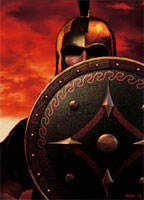Let me start by explaining that I'm a slut for certain sorts of fiction. Namely anything to do with time travel. Or pirates. Even better if it's time traveling pirates (Ice Pirates anyone?). So occasionally I will pop over to amazon.com, bookbrowse.com or bookcrossing.com and search around for keywords "time travel".
I'm also a theology/philosophy junkie so when my search on Amazon turned up The Didymus Contingency by Jeremy Robinson, my curiosity was piqued.
 The story is about two physicists who are working on a super secret project in the Arizona desert. That project is to figure out how to time travel. Their future selves send back in time the technology to time travel, to their past selves, and while drunk, atheist Dr. Tom Greenbaum decides he wants to go back in time to meet Jesus and prove to his believer partner, Dr. David Goodman that Jesus was a fraud and never rose after three days & was most certainly not God.
The story is about two physicists who are working on a super secret project in the Arizona desert. That project is to figure out how to time travel. Their future selves send back in time the technology to time travel, to their past selves, and while drunk, atheist Dr. Tom Greenbaum decides he wants to go back in time to meet Jesus and prove to his believer partner, Dr. David Goodman that Jesus was a fraud and never rose after three days & was most certainly not God.
So I was interested 'cause that would be one heck of an interesting place to drop yourself in time. As a non-believer but lover of theology, I thought there might be some interesting twists between the two characters.
I ordered the book from Amazon and awaited its arrival. As soon as the box got here, I ripped it open, removed the book, and sniffed the pages. (Is that really weird, sniffing pages? I love the smell of new books.) I flipped it over and read the reviews on the back and saw something that gave me pause.
There was a reference to the Left Behind series. So I thought to myself, "wait a tic! What's this? I don't want any Kirk Cameron religious nutbar goop to rub off on my time travel fiction!" But I decided to forge ahead and crossed my fingers there would be no attempt at sly conversion.
The story begins with Tom flying to Africa to meet his wife, Megan, who is a missionary there. However, she's running her ass off through the jungle because some native sorts with boomsticks are killing all the Christians. She's trying to make it to the airfield to warn Tom to turn around. She pauses when she sees a man getting the shit beat out of him by four tribesmen, and she is shocked when the man sees her and tells her to run, using her name. She didn't know who the guy was, so how did he know her name? We later find out that it was David. Problem here being that when David called her name, the tribesman looked up and saw and began to pursue her.
She makes it to the clearing and waves off Tom, and he sees her look of panic, her look of fear, and is gripped with uncertainty and terror of his own. He sees her jerk and then blood flies, and Megan ends up dying in Tom's arms.
This gives him a very bad taste in his mouth (not that any blood got in there) in regards to God and religion; Megan dying for being a Christian.
The murderers raise their weapons at Tom and ask, "are you a believer as she?" and he said no, he would never believe as she did, and they laughed and said he was free to live.
Fast forward a decade and Tom is working in a super secret facility in the Arizona desert that is accessed through a dilapidated shack that is completely ignorable by anyone driving by, but actually houses a vehicle platform and retinal scan for security. Once vehicle occupants are approved, the platform descends many stories into the heart of the installation.
The two friends carpool together, eat dinner together, and basically just hang out. Tom is a tiny bit bitter but overall a nice fella and he enjoys teasing David about his religion. And by tease I mean poke at him for his lack of cursing or alcohol consumption. But it's all good-natured ribbing.
The two, facing pressure from their boss have apparently chosen a specific date and time for their future selves to send back the technology needed to time travel. With a bright flash and a bang at the designated minute, but a few seconds late, the lab begins to fill up with various electronic equipment, as well as instructions and ten wristwatches.
They explore the gadgets like giddy boys with new Tonka trucks and go out to celebrate. Tom gets drunk, then gets melancholy thinking of his dead wife. He decides that he must convince David that Jesus was nothing more than a man, and once he's convinced, he will give up his faith and live a free and atheist lifestyle.
It should be noted here that both were/are Jewish. So I guess that makes David a Jew for Jesus but it wasn't made a big deal. It just was what it was. Which was convenient for the storyline because they both have to have knowledge of Israel and experience traipsing around. The average time traveler would probably not do so well being dropped into the Middle East 2000 years ago.
Drunk Tom returns to the lab, dons a robe costume to fit in to the time frame he's hopping into, straps on a watch and ZAP, BANG! he's laying in the dirt barfing his guts out in Israel.
Conveniently enough, a couple of Samaritans wander by and offer help. They were good like that. Har har.
It's not long before David realizes what Tom has done, and fearing a massive impact to the planet if Jesus is exposed as a fraud, removing Christianity forever, and wanting to rescue is friend, David throws on a robe and watch as well and flings himself into the past. He also barfs.
 Lucky for David, he happens to speak the Aramaic of 2000 years ago. Tom limps along on his rudimentary Hebrew. Thankfully, Tom remembers how to order beer in the right language.
Lucky for David, he happens to speak the Aramaic of 2000 years ago. Tom limps along on his rudimentary Hebrew. Thankfully, Tom remembers how to order beer in the right language.
So! Armed with the proper garments and language, David and Tom both set out on their disparate goals: Tom to prove Jesus a fraud, and David to save Tom from himself.
I have to say that I really liked the way Jesus and his disciples were portrayed. Nothing spectacular, just 12 guys hanging out, touring the country, visiting many pubs. Even one description of having to wait a minute for some preachin' 'cause Jesus was behind a tree peeing.
What I didn't particularly like was the lack of explanation about how any of the time travel worked. There weren't any theories put forth or mentions of worm holes or relativity. Just 10 watches that a person sets to the correct time and latitude/longitude of the place they want to go. The watches also come with a nifty GPS bit that will help you find where someone else with a watch is.
There were also itsy bitsy mechanical "flies" that had facial recognition chips and poison needles as part of an assassin's tools. Well now. That seems a bit far-fetched. All of that and the size of a fly? Hmm.
Another problem I had was the declaration of undying love between two characters who had never been out on a date or seen each other naked. There should have been more back story for that relationship. It came off as a little unbelievable.
Last issue I can't explain too much, but suffice to say it has to do with a 2000-year old bible character's reaction to the future when he was brought forward as some muscle was just not realistic. Old dead dude put in front of computers and elevators and doesn't so much as bat an eye. Uh huh.
Moving on.
The author incorporated some bible stories into this book, but not in a sermon sort of way. It was as a foil for Tom to explain why it was trickery and deception. I recognized some of the bible bits, but not all. But it didn't detract from the book in the least.
The story moved along at a decent clip. It was easy to get into and not want to put down. There was action and adventure and a bit of romance, including some involving a hot sister of Lazarus.
There was a wee moment of confusion when "voices" were introduced around the middle of the book. Some shadowy figure of doom and evil. But it manifested only as "voices" in a person's head. I had no idea where that was coming from. It wasn't explained until near the end. Maybe another reader might catch on sooner who it was but I was entirely in the dark about the identity.
I dreaded that I would be taken by surprise at some point and thrown a bucket of conversion in my face. So I kept one eye prepped for spotting that sort of hanky panky while my other eye just kept on enjoying the story. Then it finally happened. At the end of the book, there it was. How the world would be without Christianity, how the USA wouldn't exist and other "arguments" I've seen put forth by the more fanatical sorts of religious people and I couldn't stop myself from grinding my teeth and wanting to bitch slap the author for sticking that crap in there.
The upside to it was that it only lasted about two pages. Two pages out of 290 isn't bad. I truly expected more.
I really liked this book. It didn't turn me into a believer or anything, but I would read it again. I thoroughly enjoyed the "humanizing" of Jesus and the disciples and how their characters were written. Like I said, the science aspect was lacking, but it only took a little suspension of disbelief to let go of that issue.
No, this book isn't terribly unique and there is an air of the formulaic. Good versus evil. Temptation. Believer and non-believer. Does Jesus speak American English? If you want something pretentious, this isn't the book to read.
The author has now written a few other books and I'm intrigued. He writes from a religious perspective, using bible stories. But if he keeps up the non-proselytizing nature of The Didymus Contingency, then I can see myself picking up his other works.
I actually read much of this book like I do the Thursday Next books. Impatient to flip to the next page to see what familiar character is going to pop up next. Don't know the Thursday Next series by Jasper Fforde? You should remedy that. Or I could review the first book in the series, The Eyre Affair. Maybe I'll get around to that soon.
Anyway, if you like time travel fiction then The Didymus Contingency will keep you entertained enough during the morning commute on the subway.
Archives
 But today we are here to talk about The Half-Blood Prince. Book six in the seven book series that began with a boy finding out he was a wizard. The day I picked up that first book I was transfixed and transformed. JK Rowling tapped in to a well of creativity that is based on mythology and language and a marriage of a thousand years of imagination. Taking the best pieces of everything we might have known in a fairy tale and reworked it into an innovative and exciting set of characters and adventures that turned out to be the key to grabbing a whole new generation of kids and addicting them to reading.
But today we are here to talk about The Half-Blood Prince. Book six in the seven book series that began with a boy finding out he was a wizard. The day I picked up that first book I was transfixed and transformed. JK Rowling tapped in to a well of creativity that is based on mythology and language and a marriage of a thousand years of imagination. Taking the best pieces of everything we might have known in a fairy tale and reworked it into an innovative and exciting set of characters and adventures that turned out to be the key to grabbing a whole new generation of kids and addicting them to reading. Another change from previous books is Dumbledore. He is no longer an omniscient being, he has flaws and uncertainties. He might be wrong. That's something Harry has to cope with a well. Understanding his heroes don't know everything and he would have to learn some things on his own.
Another change from previous books is Dumbledore. He is no longer an omniscient being, he has flaws and uncertainties. He might be wrong. That's something Harry has to cope with a well. Understanding his heroes don't know everything and he would have to learn some things on his own. While Paul is out of town on business, NC is nosing around in his library, snooping on the top shelf and found a copy of Kama Sutra as well as a mysterious book full of blank pages and one woodcut image of a dragon. Within the dragon's claws is a banner with a single word, "Drakulya".
While Paul is out of town on business, NC is nosing around in his library, snooping on the top shelf and found a copy of Kama Sutra as well as a mysterious book full of blank pages and one woodcut image of a dragon. Within the dragon's claws is a banner with a single word, "Drakulya".  Now, I don't want to sound like this book was complete shit. It wasn't. There were moments of enjoyment for me. It started off interestingly enough, but after about 30 pages I got bored. I kept at it, and it snagged me again around page 280. Lost me again at 500. Page 591 gave me a bit of "ooh, that was unexpected" and then immediately I became annoyed because how in the hell does someone who is being held captive by Dracula have the time to type out pages and pages of letters in a day or two?
Now, I don't want to sound like this book was complete shit. It wasn't. There were moments of enjoyment for me. It started off interestingly enough, but after about 30 pages I got bored. I kept at it, and it snagged me again around page 280. Lost me again at 500. Page 591 gave me a bit of "ooh, that was unexpected" and then immediately I became annoyed because how in the hell does someone who is being held captive by Dracula have the time to type out pages and pages of letters in a day or two? 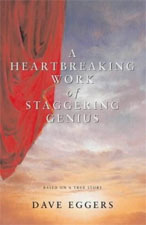 This is an autobiography. But there's more to it. It's charming and self-deprecating, and I thoroughly enjoyed reading every word—and by every word I mean every single word. See, I'm that person who actually looks on that one page with all the publishing info and Library of Congress filing position. To my surprise I found a not only a Kinsey scale pinpointing how straight/gay Eggers is but also other little informational tidbits.
This is an autobiography. But there's more to it. It's charming and self-deprecating, and I thoroughly enjoyed reading every word—and by every word I mean every single word. See, I'm that person who actually looks on that one page with all the publishing info and Library of Congress filing position. To my surprise I found a not only a Kinsey scale pinpointing how straight/gay Eggers is but also other little informational tidbits.  How does a person laugh at cancer? Or laugh at a friend who took a header off a balcony and ends up brain damaged? Or write that your own brother stinks like pee and you're worried that he's gonna be that kid in school who wreaks? Who decides that sending out a press release that Adam Rich, star of the old show Eight is Enough, is dead? Well, that would be Dave Eggers, the fella who thought that writing his life's story at age 29 was a good idea. Turns out he was dead on.
How does a person laugh at cancer? Or laugh at a friend who took a header off a balcony and ends up brain damaged? Or write that your own brother stinks like pee and you're worried that he's gonna be that kid in school who wreaks? Who decides that sending out a press release that Adam Rich, star of the old show Eight is Enough, is dead? Well, that would be Dave Eggers, the fella who thought that writing his life's story at age 29 was a good idea. Turns out he was dead on. 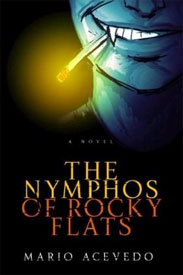 The Nymphos of Rocky Flats by Mario Acevedo follows Felix Gomez as an Army veteran turned vampire turned private detective who has been hired by a former friend to investigate an outbreak of nymphomania at the Rocky Flats Plant in Colorado outside of Denver. During the environmental cleanup, a group of female employees encounter an unknown room and are exposed to a mysterious toxin that sends them off on a sexual rampage as they bang men like a screen door in a hurricane.
The Nymphos of Rocky Flats by Mario Acevedo follows Felix Gomez as an Army veteran turned vampire turned private detective who has been hired by a former friend to investigate an outbreak of nymphomania at the Rocky Flats Plant in Colorado outside of Denver. During the environmental cleanup, a group of female employees encounter an unknown room and are exposed to a mysterious toxin that sends them off on a sexual rampage as they bang men like a screen door in a hurricane.  Frank McCourt pretty much recounts his childhood growing up in poverty. First in Brooklyn, but unable to find work, his father decides they should all go back to Limerick, Ireland. Except Frank’s father was a drunk who couldn’t hold a job. And when he did, he used any pay to go get a few pints instead of buy food for the family. Though this poverty didn’t stop him from repeatedly knocking up Angela, his wife.
Frank McCourt pretty much recounts his childhood growing up in poverty. First in Brooklyn, but unable to find work, his father decides they should all go back to Limerick, Ireland. Except Frank’s father was a drunk who couldn’t hold a job. And when he did, he used any pay to go get a few pints instead of buy food for the family. Though this poverty didn’t stop him from repeatedly knocking up Angela, his wife.  McCourt really did just lay it all out there; the good and the very bad.
McCourt really did just lay it all out there; the good and the very bad. 
 And so you have just a tiny bit of the crazy ass stuff going on in this week’s book, Plainclothes Naked by Jerry Stahl. Jerry Stahl is a former television writer, writing for shows such as CSI, Alf, Moonlighting, Northern Exposure and many more. He’s also written other novels, one being Permanent Midnight which was made into a movie starring Ben Stiller.
And so you have just a tiny bit of the crazy ass stuff going on in this week’s book, Plainclothes Naked by Jerry Stahl. Jerry Stahl is a former television writer, writing for shows such as CSI, Alf, Moonlighting, Northern Exposure and many more. He’s also written other novels, one being Permanent Midnight which was made into a movie starring Ben Stiller.  The Mayor of Pittsburgh, Marge, happens to be Manny’s ex-wife. The picture happened to have been nabbed by Tina, an employee of Seventh Heaven nursing home.
The Mayor of Pittsburgh, Marge, happens to be Manny’s ex-wife. The picture happened to have been nabbed by Tina, an employee of Seventh Heaven nursing home.  There’s a neighbor woman, Eileen Shears, with a dog, Wellington, down the street and this comes to the crux of the adventure. Christopher discovers the dog dead in Eileen’s front yard, stabbed by a pitchfork. Eileen discovers Christopher over the dog on the lawn and concludes it was Christopher that killed the dog. He didn’t though. But he liked the dog so decides he’s going to solve the murder of Wellington.
There’s a neighbor woman, Eileen Shears, with a dog, Wellington, down the street and this comes to the crux of the adventure. Christopher discovers the dog dead in Eileen’s front yard, stabbed by a pitchfork. Eileen discovers Christopher over the dog on the lawn and concludes it was Christopher that killed the dog. He didn’t though. But he liked the dog so decides he’s going to solve the murder of Wellington. 
 Major Rueben Malich, formerly in combat in the Middle East is sent stateside to attend university where he is enrolled in the courses of one Professor Averell Torrent. Unsure of what he was doing there but attentive nonetheless and taking notes in Farsi, he listens to Torrent and on occasion participates in verbal sparring. One great mind pitted against another. Arguing about Rome versus the United States. Absolute power. Revolution. World domination. Democracy. Race. The usual.
Major Rueben Malich, formerly in combat in the Middle East is sent stateside to attend university where he is enrolled in the courses of one Professor Averell Torrent. Unsure of what he was doing there but attentive nonetheless and taking notes in Farsi, he listens to Torrent and on occasion participates in verbal sparring. One great mind pitted against another. Arguing about Rome versus the United States. Absolute power. Revolution. World domination. Democracy. Race. The usual.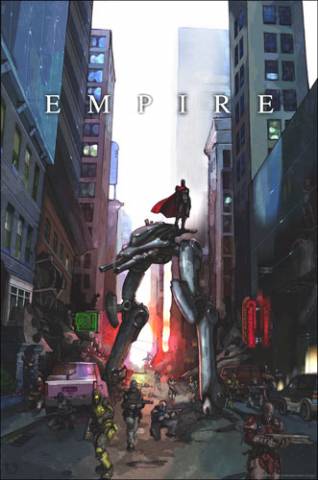 This is tale of what might happen if someone like George Soros used all of his resources to “fix” the country after the debacle of the illegal elections of 2000 and 2004. To put it all right, the way it should have been if the true winner had taken office.
This is tale of what might happen if someone like George Soros used all of his resources to “fix” the country after the debacle of the illegal elections of 2000 and 2004. To put it all right, the way it should have been if the true winner had taken office.

 The story is about two physicists who are working on a super secret project in the Arizona desert. That project is to figure out how to time travel. Their future selves send back in time the technology to time travel, to their past selves, and while drunk, atheist Dr. Tom Greenbaum decides he wants to go back in time to meet Jesus and prove to his believer partner, Dr. David Goodman that Jesus was a fraud and never rose after three days & was most certainly not God.
The story is about two physicists who are working on a super secret project in the Arizona desert. That project is to figure out how to time travel. Their future selves send back in time the technology to time travel, to their past selves, and while drunk, atheist Dr. Tom Greenbaum decides he wants to go back in time to meet Jesus and prove to his believer partner, Dr. David Goodman that Jesus was a fraud and never rose after three days & was most certainly not God.  Lucky for David, he happens to speak the Aramaic of 2000 years ago. Tom limps along on his rudimentary Hebrew. Thankfully, Tom remembers how to order beer in the right language.
Lucky for David, he happens to speak the Aramaic of 2000 years ago. Tom limps along on his rudimentary Hebrew. Thankfully, Tom remembers how to order beer in the right language.  Meanwhile, the father, Norman, is confused by these people he is somehow related to, has no idea how to communicate with them, and Deirdre and he constantly go round for round screaming and shouting, culminating with the Deirdre accusing Norman of trying to kill her. So what does he do? Loses himself in booze.
Meanwhile, the father, Norman, is confused by these people he is somehow related to, has no idea how to communicate with them, and Deirdre and he constantly go round for round screaming and shouting, culminating with the Deirdre accusing Norman of trying to kill her. So what does he do? Loses himself in booze.  Augusten Burrough’s brand of writing was swift and easy to understand, a quick read that can be gotten through on a flight from the Midwest to NYC.
Augusten Burrough’s brand of writing was swift and easy to understand, a quick read that can be gotten through on a flight from the Midwest to NYC.  When David discovered that Phoebe was handicapped, he handed her over to Caroline and instructed his nurse to take her to a home for mentally challenged kids, so she bundled up Phoebe & took off for the home.
When David discovered that Phoebe was handicapped, he handed her over to Caroline and instructed his nurse to take her to a home for mentally challenged kids, so she bundled up Phoebe & took off for the home.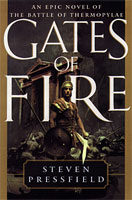 On March 9th the movie 300 is being released in theaters. The flick is based on a graphic novel (comic book) of the same name and I am looking forward to it seeing it. It's that release that brings me to the book review for this week.
On March 9th the movie 300 is being released in theaters. The flick is based on a graphic novel (comic book) of the same name and I am looking forward to it seeing it. It's that release that brings me to the book review for this week.